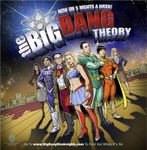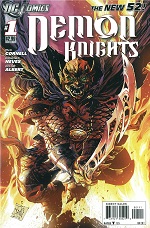
An episode of The Big Bang Theory recently featured its characters discussing DC’s New 52 push, which is a decent marketing coup by any stretch. The show is a huge hit and is largely credited with introducing nerd culture to the mainstream by its fans. Television audiences are no longer only laughing at the nerds, they’re laughing with them as well.
But it’s that telling ‘only’ in the last sentence that sticks in my craw. Characters like Sheldon, played by Jim Parsons, both amuse in their  traditional comedic roles as well as being a figure of ridicule. Sticking with Sheldon for a moment, one example is the episode where he drinks coffee for the first time. He feels instantly compelled to dress up as The Flash. So the joke is extended beyond a typical scenario – a shut-in is exposed to caffeine/nicotine/alcohol/marijuana for the first time and behaves oddly – and rooted in comic books. Yes, fans no doubt smile in recognition at the reference to a popular superhero, but non-fans are laughing at the absurd costume, the ridiculous urge on the part of the character to be a superhero. There is a curiously segregatory effect at play here. Instead of introducing nerddom to the mainstream, The Big Bang Theory ghettoises its subjects in order to mock them.
traditional comedic roles as well as being a figure of ridicule. Sticking with Sheldon for a moment, one example is the episode where he drinks coffee for the first time. He feels instantly compelled to dress up as The Flash. So the joke is extended beyond a typical scenario – a shut-in is exposed to caffeine/nicotine/alcohol/marijuana for the first time and behaves oddly – and rooted in comic books. Yes, fans no doubt smile in recognition at the reference to a popular superhero, but non-fans are laughing at the absurd costume, the ridiculous urge on the part of the character to be a superhero. There is a curiously segregatory effect at play here. Instead of introducing nerddom to the mainstream, The Big Bang Theory ghettoises its subjects in order to mock them.
Add the questionable racial humor as well and is this a latter-day Amos ‘n’ Andy?
 My issue with The Big Bang Theory is that it isolates the characters from the real world. The contrast between the nerds and Kaley Cuoco‘s Penny was the source of much of the early seasons humor – ‘why on earth would a beautiful young woman associate with such geeks!’ – but while the show has begun to move away from that one-note premise in recent years, it still presents the nerds as existing within a kind of vacuum. If nerds were truly mainstream that would not be the case. In fact, there have been a number of shows featuring geeky characters that treated them as legitimate story protagonists and not figures of fun.
My issue with The Big Bang Theory is that it isolates the characters from the real world. The contrast between the nerds and Kaley Cuoco‘s Penny was the source of much of the early seasons humor – ‘why on earth would a beautiful young woman associate with such geeks!’ – but while the show has begun to move away from that one-note premise in recent years, it still presents the nerds as existing within a kind of vacuum. If nerds were truly mainstream that would not be the case. In fact, there have been a number of shows featuring geeky characters that treated them as legitimate story protagonists and not figures of fun.
Take Spaced for example. Simon Pegg plays de facto geek Tim who, broken-hearted and embittered after being dumped, agrees to pretend to be in a relationship with Daisy (Jessica Hynes) in order to move into a ‘couple’s only’ flat. Spaced was chock-full of references to cult films, comics and genre television shows courtesy of the free-wheeling scripts and director Edgar Wright’s fugue-style of packing each scene with as many easter eggs as possible. The creators would later team up again for Shaun of the Dead and Hot Fuzz, demonstrating that their own brand of nerd-humor was not only accessible to mainstream audiences, but immense fun as well.
Another example would be, of all things, Friends! Understandably this is not the first show that people think of in relation to nerdy matters, but  Friends is notable for featuring not only a positive depiction of nerds, but making one particular geeky character the center of much of its jokes. I am speaking of course of Chandler Bing played by Matthew Perry, a textbook assimilated geek. Overeducated and under stimulated, his entire schtick was his habit of commenting on the action occurring around him as it happened. In many ways he represents the fate of many nerds before the current wave of geek chic arrived. He grew up to become a member of the professional white-collar class, putting away childish things until the weekend rolled round. Whereas now nerds are popular because comic book films and computer games are profitable, back in the 90’s Chandler was just another wage-slave who knew he was destined for better things if only he could work up the nerve. This leads into the running joke of the series that the audience never actually discovers what he does for a living. It doesn’t really matter, what makes him appealing and the root of many of his jokes is how his geeky perspective on life feeds into his contrarian nature. Contrast this with Ross Gellar, whose overt geekiness is tolerated because he is an academic. In many ways, the cast of the The Big Bang Theory are just Ross Gellar times four.
Friends is notable for featuring not only a positive depiction of nerds, but making one particular geeky character the center of much of its jokes. I am speaking of course of Chandler Bing played by Matthew Perry, a textbook assimilated geek. Overeducated and under stimulated, his entire schtick was his habit of commenting on the action occurring around him as it happened. In many ways he represents the fate of many nerds before the current wave of geek chic arrived. He grew up to become a member of the professional white-collar class, putting away childish things until the weekend rolled round. Whereas now nerds are popular because comic book films and computer games are profitable, back in the 90’s Chandler was just another wage-slave who knew he was destined for better things if only he could work up the nerve. This leads into the running joke of the series that the audience never actually discovers what he does for a living. It doesn’t really matter, what makes him appealing and the root of many of his jokes is how his geeky perspective on life feeds into his contrarian nature. Contrast this with Ross Gellar, whose overt geekiness is tolerated because he is an academic. In many ways, the cast of the The Big Bang Theory are just Ross Gellar times four.
 One final example of a show that demonstrates nerd humor while not being widely regarded as such a program is the granddaddy of Friends, Spaced and the majority of situational comedies in recent years – Seinfeld. Famously written off/celebrated as the ‘show about nothing’, Seinfeld was basically a show about four likable jerks. But while Jerry Seinfeld, playing an exaggerated version of himself, appears in-universe as a successful and laid back sort, the scripts frequently allude to just how nerdy he is. For a start Jerry is a huge Superman fan. One episode has him pursue a student reporter because he believes she is his ‘Lois Lane’. His apartment has an eye-catching Superman statuette beside the door. In the episode The Race Jerry even breaks the fourth-wall in a tribute to the old Superman comics and winks at the audience – something we haven’t seen in the books themselves since Alan Moore’s Whatever Happened to the Man of Tomorrow. Fellow cast-member Patrick Warburton even voiced an animated version of the Man of Steel for a commercial, in which Seinfeld appeared.
One final example of a show that demonstrates nerd humor while not being widely regarded as such a program is the granddaddy of Friends, Spaced and the majority of situational comedies in recent years – Seinfeld. Famously written off/celebrated as the ‘show about nothing’, Seinfeld was basically a show about four likable jerks. But while Jerry Seinfeld, playing an exaggerated version of himself, appears in-universe as a successful and laid back sort, the scripts frequently allude to just how nerdy he is. For a start Jerry is a huge Superman fan. One episode has him pursue a student reporter because he believes she is his ‘Lois Lane’. His apartment has an eye-catching Superman statuette beside the door. In the episode The Race Jerry even breaks the fourth-wall in a tribute to the old Superman comics and winks at the audience – something we haven’t seen in the books themselves since Alan Moore’s Whatever Happened to the Man of Tomorrow. Fellow cast-member Patrick Warburton even voiced an animated version of the Man of Steel for a commercial, in which Seinfeld appeared.
Seinfeld’s affection for comics is used to compliment the show’s humor, but is not denigrated or mocked. In comparison The Big Bang Theory feels like a step backwards for geekdom. This is not acceptance – this is tolerance, which is an insidious concept.
Hanging out with the cast of The Big Bang Theory would be my own private hell. I’d much prefer to risk getting a staph infection and drink beers with the guys from It’s Always Sunny in Philadelphia – the true inheritors of the Seinfeld mantel (and, if their Day Man number is any indication, not averse to superheroes either).











Wonderful article. Thanks for the read!
That's interesting Emmet. You brought up some pretty good points. I still love that show thought.
Emmet I think you may be over thinking this one a little. In theatre there are two key rules to comedy…The first exaggerate, no matter what the source material is you must take it to an extreme proportion. The second is you must then play that extreme behavior with the honesty and attachment of a drama. It must come off as genuinely serious. The reason Jim Parsons portrayal of Sheldon works is because it is so over the top and yet you would expect it to be Jim's real behavior in person if you did not stop and use some common sense. It is the mark of a good comedic actor.
I accept that Parsons is a decent performer. I made no comment on that. But he is playing a caricature of how a nerd would behave and that I credit to the mind of Chuck Lorre – not a man known for his subtleties.
Agreed, which is why, as a nerd/geek/etc, I do not take offense
Yes but – and I really must go to bed, still I add this – you would never want to be known 'just' as that.
This is my point. Geeky interests, sure. But to the exclusion of all else….limited source of drama for a story (as for a life, well that's a whole other matter).
It did occur to me to mention the effect of the direct market on comic fandom as well, but once again, that can wait for another day.
[knock, knock, knock] Emmet? [knock, knock, knock] Emmet? [knock, knock, knock] Emmet?
…..[long yawn]….yes?